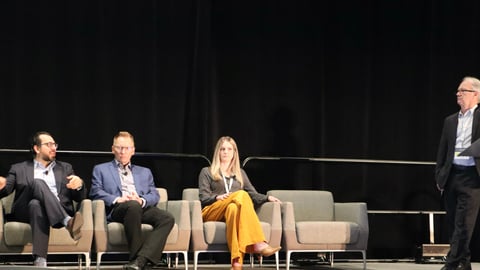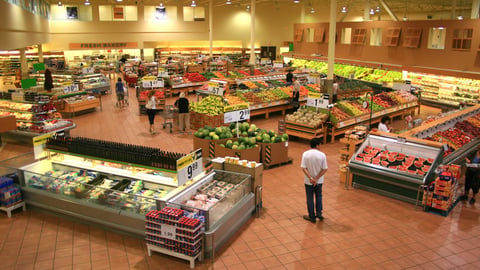Incoming CFIG chair Dan Bregg on biggest challenges and opportunities for independent grocers
Dan Bregg didn’t set out to work in grocery. Having grown up in his family’s Surrey, B.C. restaurant he thought his path was set. “I fully expected to be a restaurateur,” he says. But when his family decided to up and sell the business just before his 18th birthday, Bregg had to come up with a different plan.
After pursuing a designation as a certified public accountant (CPA), he landed a job at a small accounting firm that worked with Buy-Low Foods, the B.C.- based independent grocer. A few years later, an opportunity came up to join the Buy-Low team and Bregg, wooed by the fast-paced nature of the grocery business, seized the opportunity. In the ensuing 36 years, he hasn’t looked back. “Because Buy-Low was, at that time, a small company [it has since expanded to include Nesters Market, Nature’s Fare Markets, Van-Whole Produce and Choices Markets], I had opportunities to be involved in far more than just the finance area,” he says. “As the company grew, particularly after we became part of the [Jim] Pattison Group, I had the chance to run IT, legal, human resources and, ultimately, operations. The diversity of experience and opportunity to make a real difference in the company got me hooked.”
These days, in addition to serving as president of Buy-Low Foods and Associated Grocers, Bregg is part of The Pattison Food Group’s executive team. The group was formed last year to unite Jim Pattison Group’s grocery businesses, which include Buy-Low Foods and Save-On-Foods, among others. And now, Bregg adds to his duties as the chair of the Canadian Federation of Independent Grocers (CFIG), where he’ll be working to advocate for the country’s indie grocers.
We recently caught up with Bregg and spoke to him about everything from his career in grocery, his priorities as CFIG chair and the opportunities ahead for independents.
This interview has been edited for length and clarity.
Buy-Low Foods has been around for more than 55 years – how do you ensure it stays relevant to customers?
Over the years, our company has evolved and grown. And today, as part of the Pattison Food Group, our operations focus is as solid as ever. We are relevant because we believe we are in the people business, not the food business. Our goal is to deliver on our Always Customer First mission and do the right thing for our customers and communities every day. And we are successful because we are truly part of the fabric of the communities we serve.
In your long career in grocery, what has been the toughest decision that you’ve had to make?
This is a really hard question. The most difficult decisions are always about people. I have always believed that if an individual is not meeting expectations, it usually means that we as leaders have not done a good enough job of providing them with the necessary training, resources or support. At the same time, there are some who simply are not capable or will not do their part to meet expectations and a parting of the ways is necessary. Decisions like that are always tough and I’ll keep asking myself if we’d done all we should have before taking that last option. At the end of the day, it comes down to relationships and integrity, and doing the right thing for everyone involved.
What do you find most rewarding about working in the grocery industry?
The most rewarding part for me is how the independent retailers that I work with have become my friends. I’m sure that’s because of the type of people the grocery business attracts, but it might also be because we are the only ones that understand each other [laughs].
What’s next for Buy-Low Foods/ Pattison Food Group?
In my view, the Pattison Food Group is going to continue to work to grow its business and, particularly important for me, its continuing commitment to the independent grocer.
Through Associated Grocers, VanWhole Produce and our strategic partnerships, we are completely committed to ensuring the independent grocer in Western Canada, in particular, and Canada as a whole, continue to have all the tools they need to be successful. The independent grocer is a critical link in food security in the smaller, rural and remote communities. They fill a need in their communities beyond just food, though; they provide employment, and they support local in every way. I have seen communities that just simply dried up and disappeared because the grocery store closed down and the community could no longer support people living there. We work hard to do our part to ensure this doesn’t happen.
What would you say are the biggest challenges on the horizon for independent grocers?
It would be easy to point to industry consolidation and relative size as the biggest challenges for the independent grocer. These are concerns to be sure, but there will always be a place for the independent grocer. Independents will always be the innovators, the ones that fill unmet needs in their markets, the ones with their fingers on the pulse of their communities and, therefore, I believe they will always have a place in the industry.
To me, the bigger challenges are around the transition we are seeing in the workforce and the demographic changes we are going through. Many independent grocers are reaching retirement age and are having difficulty transitioning their businesses to new ownership, for various reasons. In my own organization we are working to develop ideas and programs to help the independents we work with to make this transition successful for both them and new ownership.
As for the workforce, over the past couple of decades we have not done a good job of educating the next generations about the highly rewarding, diverse and exciting opportunities the grocery industry offers. I mean just look at me – I was a kid that worked in a restaurant, became an accountant, then lucked into the grocery industry and had interesting roles in human resources, real estate and facilities management, information technology, distribution and transportation operations and, ultimately, executive leadership. There is really no limit to career aspirations. We need to do a better job as an industry in telling our story, otherwise the independent grocer is going to struggle to fill roles in their business as we will only be seen as a first job or a stepping-stone to somewhere else.
What will independent grocers need to do to be competitive in an increasingly competitive marketplace?
I think independent grocers need to keep doing what they have always done. Independents need to identify the two or three things that they can do better than the competitor, whatever that may be, and be the best at those two or three things. Support local, know your customer and make sure that you are delivering what customers want.
Of course, I think there is a real benefit in being involved with CFIG, if nothing more than taking advantage of all the benefits of membership. And I think independents need to ensure they are getting the level of support needed to be successful from their wholesale supplier, but I am a little biased on that topic.
In your upcoming role as CFIG chair, what will be your priorities?
My priorities are completely aligned with the overall objectives of CFIG – protecting the interests of the independent grocer in Canada.
This will, of course, include the ongoing efforts of CFIG to ensure the needs of the independent grocer are considered and protected in the grocery code of conduct, the continued efforts to address credit card processing fees, and ensuring that industry and government continue to understand and appreciate both the size of independent grocers in Canada as a group and their critical role in food security and community support across the country.
Progress has been made this past year on a code of conduct for the grocery industry – what must happen for it to become a reality? Are you/CFIG optimistic about a positive outcome?
I fully believe that by the end of the year the industry will come together with a consensus on an industry-wide code of conduct for recommendation to the Federal, Provincial and Territorial (FPT) Agriculture Ministers, that the FPT will be pleased with the outcome, and that shortly thereafter we will see a made-inCanada code of conduct that the grocery industry will support for the benefit of all participants in the industry: manufacturers, suppliers, distributors and retailers – no matter if they’re large or small.
How will the code make things better for independents?
In general terms, I think one of the benefits of the code will be recognizing the importance of fair access to products for the smaller independents.
What are you most optimistic about? What do you see as the opportunities ahead for independent grocers?
I am optimistic there will always be a place for the independent grocer. I see the opportunities for independents to continue to be the innovators in the provision of new or enhanced services; in the introduction of unique products; and first to market with products that their customers want.
Because of their relative size and local connection, the independent grocer can make decisions quickly, take advantage of their flexibility and be a trial purchaser of new innovative products that a small producer is introducing to market, but that cannot produce enough to satisfy the [requirements of] large national retailers.
Independent grocers were the first to offer their customers specialized dietary offerings, they were the first to bring organic and natural products to the shelf, the first to experiment with tastes from around the world, and on and on. The independent still has that opportunity. I have never met a more creative bunch than the independent grocers serving a niche market – so I am full of confidence that they will continue to be successful for the long term.
This article was first featured in Canadian Grocer’s September/October issue.




